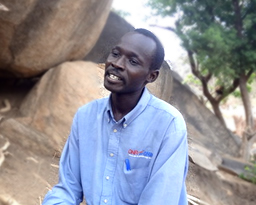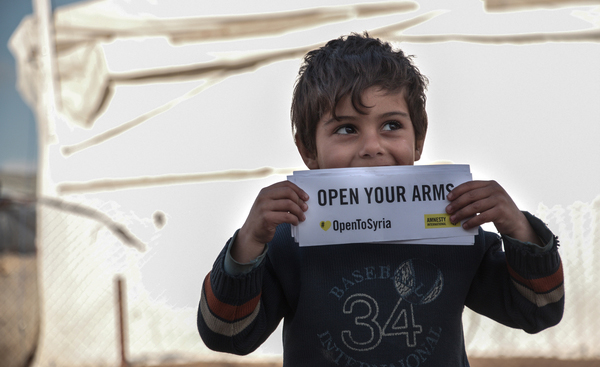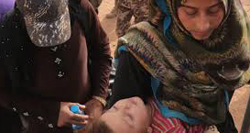In the struggle for human rights, everyone matters.

I met Alfadil Mohamed during a mission to Sudan in May to document widespread human rights violations over more than 4 years of armed conflict in the forgotten Sudanese state of South Kordofan.
Alfadil’s wife and unborn child were killed by shrapnel from a Sudanese Air Force bomb earlier this year. His mother and 2 year old son were almost killed when another bomb fell just 2 months later.
He asked why, after so many years of death raining down from the sky, the world had done nothing to stop the abuses in South Kordofan. He put it starkly, is it because we do not matter?
Alfadil’s words cut to the very heart of the struggle for universal human rights. Governments have promised that everyone’s rights matter, while betraying that promise every day.
Alfadil and his family matter. Everyone matters.
Thank you for standing with us through this past year. 2015 has reminded us that human rights struggles are very often for the long-haul, but also that continuing to shine the Amnesty candle does bring change. Justice does prevail.
 In 2004 Amnesty International launched ourStolen Sisters report, documenting the alarming levels of violence and discrimination against Indigenous women and girls in Canada. For more than a decade we have stood alongside the families of murdered and missing women, grassroots activists, Indigenous women leaders and others in pressing for a public inquiry and national action plan to address the violence.
In 2004 Amnesty International launched ourStolen Sisters report, documenting the alarming levels of violence and discrimination against Indigenous women and girls in Canada. For more than a decade we have stood alongside the families of murdered and missing women, grassroots activists, Indigenous women leaders and others in pressing for a public inquiry and national action plan to address the violence.
Our insistence never wavered. And now everything has changed.
Within six weeks of this fall’s election, Canada’s new government announced a full public inquiry, which should be underway later in 2016. As I listened to the announcement I thought of the many Indigenous women I have been humbled to stand with over the past eleven years. Their pain has been raw. Their leadership has been inspiring. Their call for justice has been so clear.
Everyone matters. Indigenous women and girls matter.
Global efforts to end the devastating conflict in Syria have, to say the least, been a colossal failure.
Amnesty International has pressed the world to at least take action to ensure that the unending wave of Syrians who have fled the country – now more than 4 million – find safe and dignified refuge.
 But the world, including Canada, looked away as the numbers of Syrian refugees mounted, conditions in neighbouring countries worsened and desperation forced more and more refugees to take deadly journeys across the Mediterranean.
But the world, including Canada, looked away as the numbers of Syrian refugees mounted, conditions in neighbouring countries worsened and desperation forced more and more refugees to take deadly journeys across the Mediterranean.
And when the heartbreaking photograph of 3 year-old Alan Kurdi’s lifeless body on a Turkish beach captured global attention, we insisted that indifference was no longer an option. It became a major election issue and the new government has come to power having made bold resettlement commitments.
How fitting that the first plane full of resettled Syrian refugees arrived in Toronto on December 10th, International Human Rights Day. And thousands more will follow.
Over the coming year we will launch a #RefugeesWelcomeHere campaign, shoring up the remarkable support for refugees Canadians have demonstrated in recent months and pressing for an end to the restrictive laws and policies that have taken hold in recent years.
Syrian refugees matter. Every refugee matters.
This year began with the worrying news that imprisoned Saudi Arabian blogger, Raif Badawi, sentenced to 10 years in prison and 1,000 lashes over 20 weeks, was set to receive his first 50 lashes. Amnesty activists around the world rallied – including in Canada, where his wife Ensaf Haidar and their three young children now live as refugees. The first fifty lashes did go ahead, but Raif Badawi has not been flogged again. International pressure has been considerable. Now we must ensure that he is freed.
 During a Mexican prison visit in 2014 I interviewed torture survivor, Angel Colon, a prisoner of conscience held in a maximum security prison for over five years. He was released five weeks after that visit. Angel spoke to Amnesty supporters from across the country at our May 2015 AGM in Halifax. His courage and grace captivated every audience who heard him, including a House of Commons Committee. His words of encouragement have stayed with many: my freedom is your victory.
During a Mexican prison visit in 2014 I interviewed torture survivor, Angel Colon, a prisoner of conscience held in a maximum security prison for over five years. He was released five weeks after that visit. Angel spoke to Amnesty supporters from across the country at our May 2015 AGM in Halifax. His courage and grace captivated every audience who heard him, including a House of Commons Committee. His words of encouragement have stayed with many: my freedom is your victory.
Every individual wrongly imprisoned matters. Every person who has faced the agony of torture matters.
At the heart of everything we do are brave women, men and young people defending rights in their communities. Sadly in many parts of the world 2015 was not a safe year to be a human rights defender
We insisted that China relent in its crackdown on the country’s human rights lawyers. We celebrated the release from prison of Azerbaijani human rights activists Leyla and Arif Yunus, but demanded that all restrictions against them be lifted. We continued to press for freedom for Bahareh Hedayat and other women’s human rights defenders imprisoned in Iran.
We also stood alongside Cindy Blackstock, untiring advocate for the rights of First Nations children in Canada, as she exposed how she had been targeted for government surveillance and reprisals because of her human rights work.
Every defender of human rights matters.
There have been many troubled, global hotspots in 2015. We were on the ground researching terrifying human rights crises right around the world. In Syria, northern Iraq, the Central African Republic, Burundi, Ukraine, Yemen, Libya, Bahrain, Sudan and South Sudan, Amnesty teams have interviewed, probed and reported. We have taken our findings to national capitals and the UN. We have held rallies, organized vigils, written letters and circulated petitions.
Every woman, every man and every child matters, in times of peace and times of war.

As we begin 2016 we face new opportunities for advancing human rights in Canadian foreign policy and domestic record. Change is urgently needed after years of inaction with respect to a number of key concerns, including the rights of Indigenous peoples, ratifying UN treaties, corporate accountability, national security reforms, gender equality, and raising human rights consistently with other countries.
Our demands for change never faltered. And many of our concerns are now reflected in commitments from the new government, such as signing on to the UN Arms Trade Treaty, reversing refugee healthcare cuts and protecting the rights of transgender individuals. Now we await follow-through.
At the very heart of all of these efforts has been the determination and generosity of Amnesty supporters across the country -- be it the crucial financial support that makes our work possible, or the energetic activism that drives change.
Thank you for your support and your commitment to a world in which everyone matters. Together we will continue to make a difference in 2016.
Sincerely,

Alex Neve
Secretary General
Amnesty International Canada
P.S. Amnesty International's vital work to protect human rights around the world depends solely on donations from supporters like you. Please make your tax-creditable gift to Amnesty International before December 31st by clicking here.












